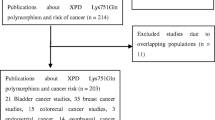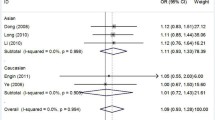Abstract
The xeroderma pigmentosum group G (XPG or ERCC5) and group F (XPF or ERCC4) play an important role in DNA repair, and produce dual incision 3′ and 5′ to the damaged nucleotide fragment. Several polymorphisms in the XPF and XPG gene have been described, including the commonly occurring Asp1104His in XPG and Arg415Gln in XPF. The published data on the association between these polymorphisms and breast cancer remained controversial. This meta-analysis of literatures was performed to derive a more precise estimation of the relationship. A total of 17 studies were identified to the meta-analysis, including 5,235 cases and 5,685 controls for XPG Asp1104His (from ten studies) and 3,910 cases and 3,985 controls for XPF Arg415Gln (from seven studies). Overall, no significantly elevated breast cancer risk was found in all genetic models when all studies were pooled into the meta-analysis (for XPG Asp1104His Asp/His vs. Asp/Asp: OR 1.02, 95% CI 0.94–1.11; His/His vs. Asp/Asp: OR 0.96, 95% CI 0.83–1.11; dominant model: OR 1.01, 95% CI 0.94–1.09; and for XPF Arg415Gln Arg/Gln vs. Arg/Arg: OR 1.00, 95% CI 0.89–1.12; Gln/Gln vs. Arg/Arg: OR 2.40, 95% CI 0.62–9.22; dominant model: OR 1.03, 95% CI 0.90–1.18). In stratified analyses, we observed an overall OR of 5.20 (95% CI 2.08–12.95) for breast cancer developing risk in the Caucasian ethnicity, comparing Gln/Gln type to wild-type Arg/Arg for Arg415Gln polymorphism. In conclusion, this meta-analysis suggests that XPG Asp1104His polymorphism is not associated with increased breast cancer risk, and XPF Arg415Gln may be a low-penetrant risk factor in the Caucasian ethnicity for developing breast cancer.
Similar content being viewed by others
References
Ramos JM, Ruiz A, Colen R, Lopez ID, Grossman L, Matta JL (2004) DNA repair and breast carcinoma susceptibility in women. Cancer 100:1352–1357
Wood RD, Mitchell M, Sgouros J, Lindahl T (2001) Human DNA repair genes. Science 291:1284–1289
Goode EL, Ulrich CM, Potter JD (2006) Polymorphisms in DNA repair genes and associations with cancer risk. Cancer Epidemiol Biomarkers Prev 11:1513–1530
Sancar A, Lindsey-Boltz LA, Unsal-Kacmaz K, Linn S (2004) Molecular mechanisms of mammalian DNA repair and the DNA damage checkpoints. Ann Rev Biochem 73:39–85
Naccarati A, Pardini B, Hemminki K, Vodicka P (2007) Sporadic colorectal cancer and individual susceptibility: a review of the association studies investigating the role of DNA repair genetic polymorphisms. Mutat Res 635:118–145
Tse D, Zhai R, Zhou W, Heist RS, Asomaning K, Su L, Lynch TJ, Wain JC, Christiani DC, Liu G (2008) Polymorphisms of the NER pathway genes, ERCC1 and XPD are associated with esophageal adenocarcinoma risk. Cancer Causes Control 19:1077–1083
Araujo SJ, Nigg EA, Wood RD (2001) Strong functional interactions of TFIIH with XPC and XPG in human DNA nucleotide excision repair, without a preassembled repairosome. Mol Cell Biol 21:2281–2291
Smith TR, Levine EA, Perrier ND, Miller MS, Freimanis RI, Lohman K, Case LD, Xu J, Mohrenweiser HW, Hu JJ (2003) DNA-repair genetic polymorphisms and breast cancer risk. Cancer Epidemiol Biomarkers Prev 12:1200–1204
Kumar R, Höglund L, Zhao C, Försti A, Snellman E, Hemminki K (2003) Single nucleotide polymorphisms in the XPG gene: determination of role in DNA repair and breast cancer risk. Int J Cancer 103:671–675
Mechanic LE, Millikan RC, Player J, de Cotret AR, Winkel S, Worley K, Heard K, Heard K, Tse CK, Keku T (2006) Polymorphisms in nucleotide excision repair genes, smoking and breast cancer in African Americans and whites: a population-based case-control study. Carcinogenesis 27:1377–1385
Shen J, Gammon MD, Terry MB, Wang L, Wang Q, Zhang F, Teitelbaum SL, Eng SM, Sagiv SK, Gaudet MM, Neugut AI, Santella RM (2005) Polymorphisms in XRCC1 modify the association between polycyclic aromatic hydrocarbon-DNA adducts, cigarette smoking, dietary antioxidants, and breast cancer risk. Cancer Epidemiol Biomarkers Prev 14:336–342
Crew KD, Gammon MD, Terry MB, Zhang FF, Zablotska LB, Agrawal M, Shen J, Long CM, Eng SM, Sagiv SK, Teitelbaum SL, Neugut AI, Santella RM (2007) Polymorphisms in nucleotide excision repair genes, polycyclic aromatic hydrocarbon-DNA adducts, and breast cancer risk. Cancer Epidemiol Biomarkers Prev 16:2033–2041
Jorgensen TJ, Visvanathan K, Ruczinski I, Thuita L, Hoffman S, Helzlsouer KJ (2007) Breast cancer risk is not associated with polymorphic forms of xeroderma pigmentosum genes in a cohort of women from Washington County, Maryland. Breast Cancer Res Treat 101:65–71
Smith TR, Levine EA, Freimanis RI, Akman SA, Allen GO, Hoang KN, Liu-Mares W, Hu JJ (2008) Polygenic model of DNA repair genetic polymorphisms in human breast cancer risk. Carcinogenesis 29:2132–2138
Rajaraman P, Bhatti P, Doody MM, Simon SL, Weinstock RM, Linet MS, Rosenstein M, Stovall M, Alexander BH, Preston DL, Sigurdson AJ (2008) Nucleotide excision repair polymorphisms may modify ionizing radiation-related breast cancer risk in US radiologic technologists. Int J Cancer 123:2713–2716
Ming-Shiean H, Yu JC, Wang HW, Chen ST, Hsiung CN, Ding SL, Wu PE, Shen CY, Cheng CW (2010) Synergistic effects of polymorphisms in DNA repair genes and endogenous estrogen exposure on female breast cancer risk. Ann Surg Oncol 17:760–771
Lee SA, Lee KM, Park WY, Kim B, Nam J, Yoo KY, Noh DY, Ahn SH, Hirvonen A, Kang D (2005) Obesity and genetic polymorphism of ERCC2 and ERCC4 as modifiers of risk of breast cancer. Exp Mol Med 37:86–90
Jorgensen TJ, Helzlsouer KJ, Clipp SC, Bolton JH, Crum RM, Visvanathan K (2009) DNA repair gene variants associated with benign breast disease in high cancer risk women. Cancer Epidemiol Biomarkers Prev 18:346–350
Milne RL, Ribas G, González-Neira A, Fagerholm R, Salas A, González E, Dopazo J, Nevanlinna H, Robledo M, Benítez J (2006) ERCC4 associated with breast cancer risk: a two-stage case-control study using high-throughput genotyping. Cancer Res 66:9420–9427
Shen MR, Jones IM, Mohrenweiser H (1998) Nonconservative amino acid substitution variants exist at polymorphic frequency in DNA repair genes in healthy humans. Cancer Res 58:604–608
Stephens JC, Schneider JA, Tanguay DA, Choi J, Acharya T, Stanley SE, Jiang R, Messer CJ, Chew A, Han JH, Duan J, Carr JL, Lee MS, Koshy B, Kumar AM, Zhang G, Newell WR, Windemuth A, Xu C, Kalbfleisch TS, Shaner SL, Arnold K, Schulz V, Drysdale CM, Nandabalan K, Judson RS, Ruano G, Vovis GF (2001) Haplotype variation and linkage disequilibrium in 313 human genes. Science 293:489–493
Juson R, Stenphen JC, Windemuth A (2000) The predictive power of haplotypes in clinical response. Pharmacogenomics 1:15–16
Fallin D, Cohen A, Essioux L, Chumakov I, Blumenfeld M, Cohen D, Schork NJ (2001) Genetic analysis of case/control data using estimated haplotype frequencies: application to APOE locus variation and Alzheimer’s disease. Genome Res 11:143–151
DerSimonian R, Laird N (1986) Meta-analysis in clinical trials. Control Clin Trials 7:177–188
Mantel N, Haenszel W (1959) Statistical aspects of the analysis of data from retrospective studies of disease. J Natl Cancer Inst 22:719–748
Egger M, Davey Smith G, Schneider M, Minder C (1997) Bias in meta-analysis detected by a simple, graphical test. BMJ 315:629–634
Hirschhorn JN, Lohmueller K, Byrne E (2002) A comprehensive review of genetic association studies. Genet Med 4:45–61
Wacholder S, Chanock S, Garcia-Closas M, El Ghormli L, Rothman N (2004) Assessing the probability that a positive report is false: an approach for molecular epidemiology studies. J Natl Cancer Inst 96:434–442
Duell EJ, Wiencke JK, Cheng TJ, Varkonyi A, Zuo ZF, Ashok TD, Mark EJ, Wain JC, Christiani DC, Kelsey KT (2000) Polymorphisms in the DNA repair genes XRCC1 and ERCC2 and biomarkers of DNA damage in human blood mononuclear cells. Carcinogenesis 21:965–971
Qiu L, Wang Z, Shi X, Wang Z (2008) Associations between XPC polymorphisms and risk of cancers: A meta-analysis. Eur J Cancer 44:2241–2253
Benhamou S, Sarasin A (2005) ERCC2/XPD gene polymorphisms and lung cancer: a HuGE review. Am J Epidemiol 161:1–14
Spitz MR, Wu X, Wang Y, Wang LE, Shete S, Amos CI, Guo Z, Lei L, Mohrenweiser H, Wei Q (2001) Modulation of nucleotide excision repair capacity by XPD polymorphisms in lung cancer patients. Cancer Res 61:1354–1357
Shen H, Spitz MR, Qiao Y, Guo Z, Wang LE, Bosken CH, Amos CI, Wei Q (2003) Smoking, DNA repair capacity and risk of nonsmall cell lung cancer. Int J Cancer 107:84–88
Cheng KK, Duffy SW, Day NE, Lam TH (1995) Oesophageal cancer in never-smokers and never-drinkers. Int J Cancer 60:820–822
Garidou A, Tzonou A, Lipworth L, Signorello LB, Kalapothaki V, Trichopoulos D (1996) Life-style factors and medical conditions in relation to esophageal cancer by histologic type in a low-risk population. Int J Cancer 68:295–299
Launoy G, Milan CH, Faivre J, Pienkowski P, Milan CI, Gignoux M (1997) Alcohol, tobacco and oesophageal cancer: effects of the duration of consumption, mean intake and current and former consumption. Br J Cancer 75:1389–1396
Author information
Authors and Affiliations
Corresponding author
Rights and permissions
About this article
Cite this article
Ding, DP., He, XF. & Zhang, Y. Lack of association between XPG Asp1104His and XPF Arg415Gln polymorphism and breast cancer risk: a meta-analysis of case–control studies. Breast Cancer Res Treat 129, 203–209 (2011). https://doi.org/10.1007/s10549-011-1447-9
Received:
Accepted:
Published:
Issue Date:
DOI: https://doi.org/10.1007/s10549-011-1447-9




